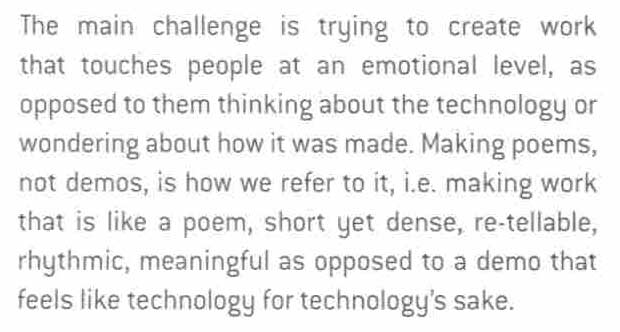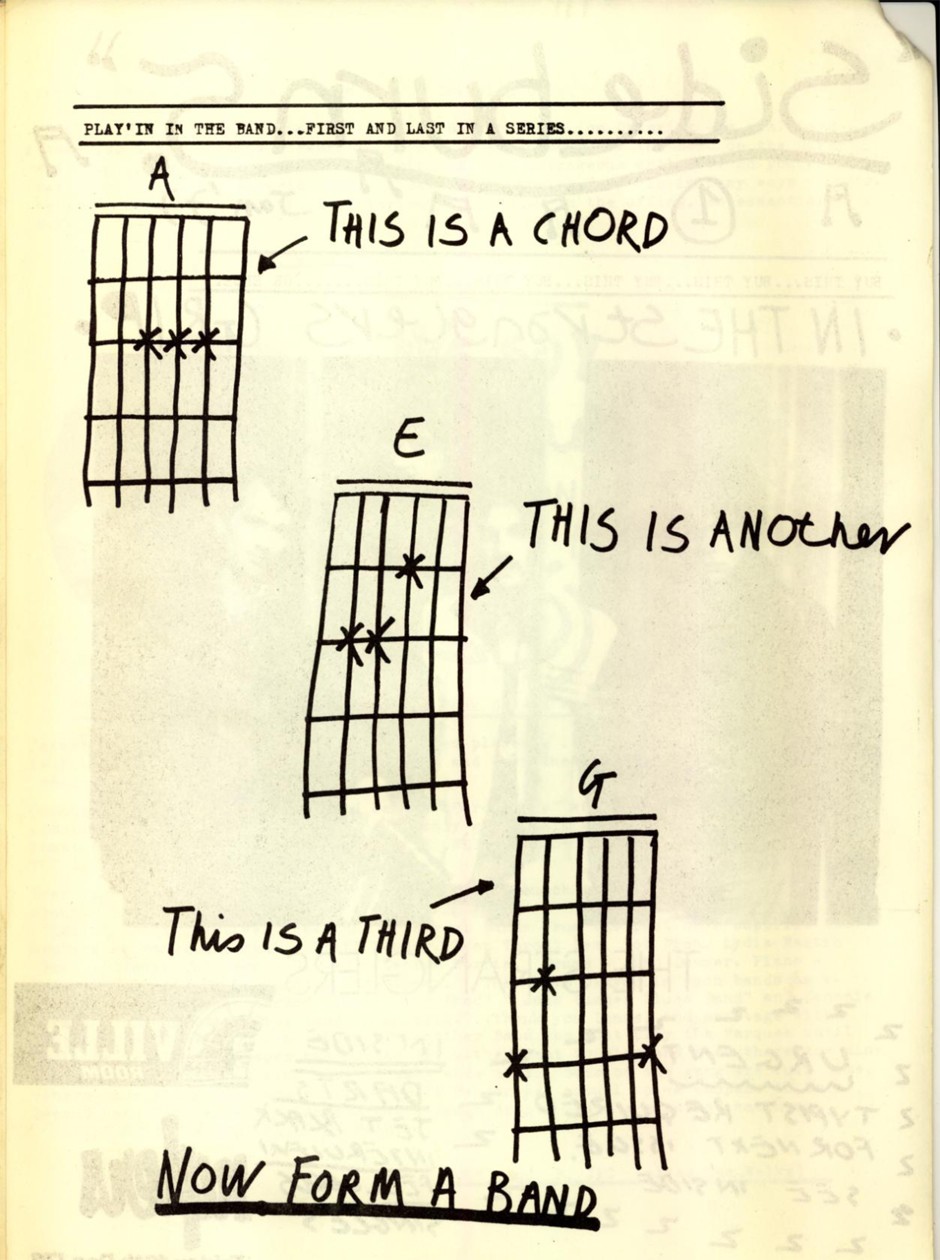Lecture 00: Introduction
Prelude to a Semester of Art Hacking
I am not here to teach you things.
I am a coach, here to facilitate your learning.
I present opportunities. They are yours to seize.
“Art?” Sounds Frivolous.
Here are two relevant perspectives on Art.
John Maeda, a quote about purpose of art from the New York Times:
Jean Tinguely on Art and Poetry:
http://www.youtube.com/watch?v=GOXh_It065E
Maeda says art is the thing worth living for; Tinguely says art is bullshit. Are they talking about the same thing? Tinguely is referring to forms which have become encrusted with idioms and rules and expectations. What Maeda calls Art, Tinguely calls life itself.
Computing, outside a School of Computer Science
- How many of you have taken a computer science course? More than one?
- How many of you are majoring or minoring in Computer Science or Engineering, or would like to?
- As curious and creative people (inventors, artists, designers, musicians, etc.), in what ways have such courses disappointed you?
Leah Buechley has observed that STEM subjects generally fail to educate students who:
- Learn concretely (from examples) rather than abstractly (from equations)
- Work improvisationally rather than by planning everything in advance
- Are interested in creating expressive, rather than utilitarian, solutions.
STEM education might benefit from the inclusion of arts-oriented pedagogic approaches. But that’s not the problem that concerns us in this room. Instead, in a world in which computing now touches every discipline, it should no longer be taken for granted that computing must be taught by computer scientists. Computer Science is a discipline, but programming is a skill (or a tool, or a medium, or better yet, a craft) which has different communities of use with different pedagogic needs.
This class is intended to address that.
Our objective is to make stirring and provocative new forms of culture.
Our medium is software and electronics.
We learn codecraft as necessary to execute our ideas.
Why We Are Here
Artists need a seat at the table: a voice in critiquing technological agendas and establishing new ones. To achieve this, we need to be hybrids. We are here to attain this hybridity.
We will be working with arts-engineering tools made for artists, by artists:
- text based programming languages (e.g. Processing, possibly openFrameworks)
- microcontrollers, sensors, and actuators (e.g. Arduino)
- patch-based programming (e.g. Max/MSP/Jitter and PureData)
You will be evaluated on craft, originality, and concept.
How Shall We Live in the World
Processing Casey & Ben, Eyeo presentation (2012)
Red Burns, who founded the NYU Interactive Telecommunications Program in 1979, passed away last week. Here is her obituary in the New York Times.
Red famously said: You’re not here to get a job, you’re here to create your own job.
Here is a slide deck she made: This is what I hope for you (Slides 110-186)
I was reminded of this when I recently read Steven Tepper, founder of our Tepper School of Business, on the Elf economy vs Fairy Economy.
I don’t care how much you know. I care how brave you are.
I would like you to write code like this brave person.
Challenges and Perils to making Art with Computers
Zachary Lieberman in IdN Interaction Issue (December 2012)
Jim Campbell, “Formula for Computer Art” (Early 2000s):
[kml_flashembed publishmethod=”static” fversion=”8.0.0″ movie=”http://golancourses.net/2013/wp-content/uploads/2013/01/campbell.swf” width=”620″ height=”290″ targetclass=”flashmovie”]
[/kml_flashembed]
Given how possible it is to basically create whatever fake reality you want in a computer, it's amazing how similar it all looks.
— Andrew Benson (@pixlpa) August 8, 2013
Some exemplary works of poetic and critical computing
Unlike large Pixar productions with hundreds or sometimes thousands of credits, nearly all of these projects were created by just one or two individuals. This is often made possible (in part) by leveraging the strengths of open-source arts engineering toolkits. It’s also the case that these practitioners have profound hybridity.
- John Simon, Jr. Every Icon (requires Java)
- Vera-Maria Glahn & Marcus Wendt (Field.io), Energy Flow
- Quayola & Abstract Birds, Partitura
- Jacob Tonksi, Balance from Within
- Camille Scherrer, Le Monde Des Montagnes
- Chris O’Shea, Hand from Above
- Christine Sugrue, Delicate Boundaries
- Julien Maire, Digit
- Scott Snibbe, Boundary Functions
- Theo Watson & Emily Gobeille, Weather Worlds
- Karolina Sobecka & James George, Sniff
- Chris Milk et al., The Treachery of Sanctuary
- Kyle McDonald & Arturo Castro, Face Substitution
- Kyle McDonald, People Staring at Computers
- Jonathan Minard & James George, CLOUDS
- Markus Kayser, Solar Sinter
- Graffiti Research Lab, L.A.S.E.R. Tag
- Helen Evans & Heiko Hansen (HeHe), Nuage Vert
- Julian Oliver, Transparency Grenade
- Graffiti Research Lab et al., Eyewriter
- Zach Lieberman et al., IQ Font
- Nervous System, Hyphae Lamps
Some previous projects by my students at Carnegie Mellon
What can a student do?
- Max Hawkins, FaceFlip
- Max Hawkins, Ant Farm Unwrapped
- Billy Keyes, SketchSynth (Keyes was inspired by his childhood experience drawing spaceship control panels)
- Caitlin Boyle & Asa Foster, We Be Monsters
- Michael Kontopoulos, Inner Forests
- Jesse Kriss, Sampling History (requires Java)
- Caryn Audenried, Color Shift
- Doug Fritz, Morning Shower
Getting to Know Each Other
Exercise 1: Blind Drawing
There are two drawings made by the Professor, Drawing-1 and Drawing-2.
- Divide students into pairs. Call one person of each pair X, the other Y.
- X students get Drawing-1.
- Y students get Drawing-2.
- Distribute blank paper and pens if necessary.
- Pairs sit back to back without looking at the other’s drawing
- X student describes his drawing to Y; Y tries to draw it from his instructions.
- Switch at a reasonable time.
- Y student describes her drawing to X; X tries to draw it from her instructions.
- Pin up the drawings at the end, so people can see. Group by X/Y.
- Discuss the results.
Other things to do today:
- Discuss the Calendar, and OMGPGH
- Point out policies on Academic Integrity
- Get people registered onto the blog
- Maker Faire, Frank-Ratchye, basic tools.

